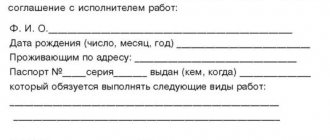Maximum contract duration
For certain types of contracts, the law may establish maximum (limit) terms for the validity
of the contract. An agreement concluded for a period exceeding the maximum period is considered concluded for a period equal to the maximum. For example, a rental agreement by virtue of clause 1 of Art. 627 of the Civil Code is concluded for a period of up to one year. According to Art. 683 of the Civil Code, a residential lease agreement is concluded for a period not exceeding five years. If such an agreement does not specify a period, the agreement is considered to be concluded for five years.
In cases provided for by the Civil Code, the validity period of the contract may be considered an essential term of the contract and its absence leads to the recognition of the contract as not concluded. For example, the validity period is recognized as an essential condition of an insurance contract (Article 942 of the Civil Code), a contract of trust management of property (clause 1 of Article 1016 of the Civil Code).
2. Proper way to fulfill obligations.
The deadline for performance is the moment when the actions constituting the subject of the obligation must be performed. If the obligation provides for or makes it possible to determine the day of its execution or the period of time during which it must be performed, the obligation is subject to execution on this day or, accordingly, at any time within the limits of such period.
In cases where the obligation does not provide for a deadline for its fulfillment and does not contain conditions allowing to determine this period, it must be fulfilled within a reasonable time after the obligation arises. An obligation that is not fulfilled within a reasonable time, as well as an obligation whose performance period is determined by the moment of demand, the debtor is obliged to fulfill within seven days from the date the creditor submits a demand for its fulfillment, unless the obligation to perform within a different period follows from the law, other legal acts, conditions obligation, customs of business or substance of the obligation
https://www.youtube.com/watch?v=ytpolicyandsafetyen-GB
The subject of fulfillment of an obligation is that thing, work, service that, by virtue of the obligation, the debtor is obliged to transfer, perform or provide to the creditor. For proper performance, the debtor is obliged to transfer exactly the item that was provided for by the contract, the law, and in their absence - the usually imposed requirements, i.e., be suitable for use for the purposes for which it is intended.
Maximum contract duration
1. The agreement does not say anything regarding the duration of the agreement (with the exception of agreements for which, in accordance with the Civil Code, the duration of the agreement is an essential condition and without specifying the term the agreement is considered not concluded, for example, an insurance agreement, a property trust management agreement);
Art. 425 of the Civil Code of the Russian Federation provides that an agreement comes into force and becomes binding on the parties from the moment of its conclusion (that is, signing by both parties), but the parties have the right to establish in the agreement that the terms of the agreement they have concluded apply to their relations that arose before its conclusion, unless otherwise established by law or follows from the essence of the relevant relations.
101. The concept and system of ways to ensure the fulfillment of obligations.
This is execution in accordance with the terms and requirements of the law, and in their absence - in accordance with the customs of business or other usually imposed requirements in relation to the proper subject, its quantitative and qualitative characteristics, the proper subjects, as well as in relation to the proper time, period, method fulfillment of an obligation, including its fulfillment in kind, without replacing it with compensation for losses and paying a penalty.
The method of ensuring the fulfillment of obligations refers to special measures that sufficiently guarantee the fulfillment of the main obligation and stimulate the debtor to behave appropriately. The law provides for the use of methods for fulfilling obligations in the event of non-fulfillment or improper fulfillment of the latter.
Ways to ensure the fulfillment of obligations are additional obligations. Having concluded the main obligation, the parties may provide for an additional means of security to ensure its proper execution.
1) payment of a penalty, i.e. payment by the debtor of a sum of money to the creditor in the event of non-fulfillment or improper fulfillment of the obligation;
2)payment of collateral, i.e. an obligation under which the creditor has the right, in the event of failure by the debtor to fulfill this obligation, to receive satisfaction from the value of the pledged property preferentially before other creditors of the person who owns this property;
3) retention of the debtor’s property (the creditor, who has the thing to be transferred to the debtor, has the right, in the event of the debtor’s failure to fulfill the obligation to pay for this thing or compensate the creditor for the costs associated with it, to hold it until the corresponding obligation is fulfilled) ;
4) guarantee (the guarantor undertakes to be responsible to the creditor of another person for the latter’s fulfillment of his obligation in full or in part with his property);
5) bank guarantee (a credit institution or insurance organization (guarantor) provides, at the request of another person (principal), a written obligation to pay the principal’s creditor (beneficiary) in accordance with the terms of the obligation given by the guarantor, a sum of money upon presentation of a written request for its payment);
6)deposit, i.e. the amount of money given by one of the parties in payment of payments due from it under the contract to the other party as proof of the conclusion of the contract and to ensure its execution;
7) other methods provided for by law and agreement.
When concluding agreements on additional security for obligations, the parties must agree on the terms and amount of security measures. It is necessary that the methods of provision be drawn up in the appropriate form provided for by law.
The invalidity of an agreement to ensure the fulfillment of an obligation does not entail the invalidity of this main obligation. But the invalidity of the latter entails the invalidity of the obligation securing it, unless otherwise established by law.
We suggest you familiarize yourself with: Certificate of criminal record, if the criminal record has been expunged. What does a criminal record certificate look like{q} Where can I get a criminal record expungement certificate{q}
Penalty (fine, penalty) is a sum of money determined by law or contract that the debtor is obliged to pay to the creditor in the event of non-fulfillment or improper fulfillment of an obligation, in particular in case of delay in fulfillment.
The penalty is applied when a monetary obligation is overdue and is calculated as a percentage of the amount of the unfulfilled obligation for each day of delay.
Penalty as a method of ensuring the fulfillment of an obligation is most often used in the field of entrepreneurial activity (supply contract, transportation contract, etc.).
The fine is subject to collection for a one-time or ongoing violation in a fixed amount or in a certain amount to the amount of the unfulfilled obligation. The agreement on a penalty is drawn up in writing, regardless of the form of the main obligation.
1) legal penalty (provided by law);
2) contractual penalty (established by agreement of the parties).
1) offset penalty (losses are compensated in the part not covered by the penalty);
2) a penalty (damages can be recovered in full in excess of the penalty);
3) exceptional penalty (collection of only penalties, but not losses is allowed);
4) alternative penalty (at the creditor’s choice, either a penalty or losses can be recovered).
The essence of retention is that the creditor, who has the thing to be transferred to the debtor or a person specified by the debtor, has the right, in the event of failure by the debtor to fulfill on time the obligation to pay for this thing or compensate the creditor for costs and other losses associated with it, to retain it until then until the corresponding obligation is fulfilled.
An item held by the creditor does not become his property. Lien is the only way to enforce the penalty arising from the law.
•subject of retention – a thing belonging to the debtor, which the creditor must transfer to the debtor or the person indicated by him;
•retention must ensure the obligation of the debtor to the creditor;
•the obligation secured by the retention was not fulfilled on time.
The claims of the creditor holding the thing are subject to satisfaction from the value of this thing in the amount and manner provided for satisfying the claims secured by the pledge.
The ratio of penalties to losses.
• when recovery of only penalties, but not losses, is allowed;
•when losses can be recovered in full in excess of the penalty;
•when, at the choice of the creditor, either a penalty or losses can be recovered.
In cases where limited liability is established for non-fulfillment or improper fulfillment of an obligation (Article 400), losses subject to compensation in the part not covered by the penalty, or in excess of it, or instead of it, may be recovered to the limits established by such a limitation. (Article 394 of the Civil Code of the Russian Federation)
Establishing the duration of the contract
The main differences are that if the contract expires, it completely ceases to be valid and it is no longer possible to demand the fulfillment of obligations under it. The expiration of the deadline for fulfilling an obligation does not terminate either the obligations under the contract or the contract itself.
For the majority of civil law contracts, for example, lease agreements, purchase and sale agreements, storage, delivery, etc., the validity periods of the agreements are established independently. However, for some types of contracts, maximum validity periods are established by law and, accordingly, their validity period should not exceed that established by law.
Law Club Conference
Look for the topic “Pseudo-jurisprudence”, a lot has been written about similar phrases there.
the debt arose from an agreement, the agreement was valid until December 31, 1998 - today it is already 2000.
-> so the contract terminated its effect - the obligations ceased. Obvious nonsense and grounds for cancellation, if that’s how it was.
Obvious nonsense and grounds for cancellation, if that’s how it was. No, not obvious, and not nonsense, everything is subtler there.
And Nikolupus either doesn’t tell us the whole situation or the AC was particularly glitchy that day - the debt arose from the agreement, the agreement was valid until December 31, 1998 - today is already 2000. -> so the contract terminated its effect - the obligations ceased.
The duration of the contract can be indefinite (going to infinity until its termination) or definite - limited. An indefinite period occurs when: 2. When the contract expressly states that it is concluded for an indefinite period; 3.
We invite you to read: Question regarding a preliminary lease agreement for non-residential premises
When the contract provides for its automatic extension; 4.
Clause 2 of Article 1016 of the Civil Code establishes that a property trust management agreement is concluded for a period not exceeding five years, unless other deadlines are established for certain types of property transferred to trust management. 34. “Binding” contracts, features of their conclusion.
Scope of application.
Question in the section: For what period is a contract for the provision of paid services concluded?
An agreement for the provision of paid services is a civil law agreement, since the relations of the parties to such an agreement are regulated not by the Labor Code of the Russian Federation, but by the Civil Code of the Russian Federation, according to which the term of the agreement is its essential condition. In other words, a civil contract cannot be concluded for an indefinite period; it must be urgent. However, the Civil Code of the Russian Federation does not establish time limits, therefore neither the minimum nor the maximum limit for the duration of a civil contract has been established.
We recommend reading: Administrative law general characteristics
The validity period of a civil law contract is determined by the parties to the contract themselves. But, given that the contract for the provision of paid services is concluded for the period of provision of certain, specific services, its duration must correspond to the volume of services ordered to the contractor.
Types by timing
According to the terms, contracts are divided into fixed-term and unlimited. Despite the clearly regulated conditions of such documents, many organizations seek to conclude a fixed-term employment contract with staff, explaining that the amount of work performed is temporary, when this type of agreement is possible only under limited circumstances prescribed in the labor code. In all other cases, the correct option for legitimizing labor relations is an open-ended contract .
Lease term and lease term
Nevertheless, it should be taken into account that in judicial practice there is a position according to which the lease agreement is recognized as concluded from the moment of transfer of property (clause 2 of Article 433 of the Civil Code of the Russian Federation) and is called a real contract. With this approach, the beginning of the contract term will coincide with the beginning of the lease term. However, the more common position is that the lease agreement is consensual.
However, the start dates of these periods may vary. For example, if the property is transferred a few days after the parties sign the contract, then the contract period will begin to run from the moment it is signed, and the lease period will begin from the moment the property is transferred. This situation is possible, since the lease agreement is recognized by most courts as consensual and, in accordance with paragraph 1 of Art. 425, paragraph 1, art. 433 of the Civil Code of the Russian Federation is considered concluded from the moment the acceptance is received by the person who sent the offer, in particular, from the moment the contract is signed by both parties.
Contract duration and obligations fulfillment period: problems and solutions (Gurin O
One of the fundamental innovations of the contract system in the field of procurement, which distinguishes it from the previously existing legislation on the placement of orders, is the institution of standard contracts. As follows from Part 11 of Art. 34 of Law N 44-FZ, over time a whole library of standard contracts (standard contract terms) should be formed. Great hopes were placed on standard contracts: many procurement specialists (including the author) thought that such contracts would become something like a treasure trove of refined formulations that had passed the crucible of judicial practice and would evoke the unconditional approval of all control bodies without exception. Such formulations could serve as a reliable guide for the customer even in the case when the draft contract is developed by him independently.
We recommend reading: Returning a sofa
In this case, based on the results of the electronic auction, a contract for the supply of goods was concluded between the parties on September 16, 2014. According to the terms of the contract, delivery of goods was to be carried out from the day following the day the contract was concluded, but no later than 12/10/2014. It also follows from the contract that it comes into force from the moment it is signed by the parties and registered in the register of contracts and is valid until December 20, 2014, and in terms of settlements - until they are fully completed.
Maximum duration of a commercial lease agreement
- The scope of the agreement must be determined: state or non-state housing stock. In the first case, the lease is of a social nature and is concluded on the basis of a corresponding decision of the government authority. If the fund is non-state, the contract is a mutual agreement.
- Both legal entities and individuals have the right to conclude such an agreement. At the same time, they must be given ownership rights to the proposed real estate, or other capabilities that allow them to carry out such operations. And, unlike the tenant, who can have any citizenship, the landlord can only be citizens of the Russian Federation.
- The main difference is that a commercial rental agreement for residential premises is concluded for a period previously agreed upon by the parties.
- This type of agreement limits the tenant's rights.
- There are no requirements regarding the size of the premises to be rented.
- The amount of remuneration for the use of real estate is determined by the parties and is fixed in the agreement. If the law provides for a maximum amount of such payment, then the amount in the contract should not exceed it.
As for social rent, it ensures the stability of housing legal relations and guarantees the implementation of the rights of citizens to receive housing from the state. In addition, this feature reflects its social and consumer function. The urgency of the contract, in turn, indicates the commercial nature of the document under consideration.
We recommend reading: Notarized alimony agreements or their notarized copies
Duration of the lease agreement - maximum and minimum
The data in the lease agreement also has its own further transformation, namely, the tenant can subsequently formalize ownership of the leased objects. In particular, for a land plot registered for personal subsidiary farming for a period of 49 years, in the event of the construction of a permanent structure on it.
A fixed-term lease is an agreement with a clearly defined duration or tied to the occurrence of an event. In particular, a lease agreement for an apartment or residential cottage may have a condition for its validity: “before the execution of a purchase and sale transaction or registration of an inheritance.”
Maximum contract duration
- a certificate of disability if such a condition exists;
- a copy of the children’s birth certificate if the employee is a father or mother of many children, as well as if the person is a single mother or a single father raising children without a mother.
- in some cases - a certificate of dependents.
The employee undertakes, during the term of the contract, to perform his labor functions for a certain remuneration and to comply with the norms of local regulations of the enterprise, and the employer, in turn, guarantees the opportunity to work, develop and receive wages.
Rental periods
The additional agreement in itself has no legal force and is autonomously invalid; it is based on the clauses of the current agreement. The agreement may provide for a change in the terms at which the contract is extended. Signing an additional agreement is less troublesome than concluding a new contract, and this is the method most often practiced by the parties.
This condition is contained in the Civil Code in Article 610. The parties under such an agreement have the right to cancel the lease at any time they wish, to do this they must notify the other party in advance ( at least three months before the end of the lease ).
For undefined period
An open-ended employment contract is a written agreement concluded between an employee and an employer for an indefinite period, which means that it does not have a clear end date for such legal relations .
This document is intended to minimize the risk of violation of the rights of a new employee and prevent abuse of powers by the employer.
The conclusion of such an obligation is directly regulated by Art. 58 of the Labor Code of the Russian Federation and provides that the employee will conscientiously and fully perform all work duties assigned to him, when, as a manager, he is obliged to promptly pay him the appropriate wages, as well as organize a safe and comfortable work environment. As a rule, the contract has a standard form and often contains the following information:
- the basis of such an agreement is the subject of the agreement itself, which explains the essence of the emergence of such legal relations;
- list of rights and work responsibilities of the employee and manager;
- the duration of the employment relationship - the agreement will clearly indicate that this document is considered unlimited;
- force majeure circumstances and corresponding guarantees, which clearly state the rights and obligations of each party in various unforeseen cases. For example, if an employee is injured at work, the employer is obliged to compensate him for damages.
The agreement also specifies the exact location (address) of the work, the start date of work and working hours, the possibility of additional payments, bonuses and incentives, the number of vacation days and days off; if the employee works in shifts, then the working hours must also be specified, as well as other provisions , if provided for by the specifics of the profession. In many organizations, the document also indicates information about the probationary period of the new employee.
Peculiarities
If Article 58 is intended to reflect the essence of an open-ended employment contract and all cases when it is advisable to conclude this type of agreement, then Art. 59 of the Labor Code of the Russian Federation enshrines all the basic principles and systematic preparation of this document. The features of such agreements are:
- the contract is always drawn up based on the will of both parties;
- a contract for an indefinite period is appropriate when management is interested in regular activities, if there is a similar vacancy in the organization.
The advantage of this agreement is the presence of special guarantees and a certain stability for both the employee and the manager, which are regulated by labor law.
The parties can terminate such an agreement at any time, however, it should be borne in mind that in order to terminate such agreements, the consent of both parties is necessary, or there are serious reasons for this, for example, if the organization in which the employee was registered is declared bankrupt, or if there are constant violations on the part of the employee or the employer of his responsibilities. Any actions beyond the scope of such agreement are also prohibited.
When drawing up this type of document, the start date for performing work duties is always indicated, but their end date is never indicated .
Can it be changed or terminated?
Changes are permissible in relation to such an agreement and can be due to many reasons, either at the initiative of management or at the request of the staff themselves.
For example, if it is necessary to transfer an employee to another vacant position and, accordingly, change information about his salary. The basis for making amendments is also a change in the employee’s work schedule, increasing or decreasing the number of working hours and working conditions.
The agreement is subject to amendment if some clauses in it are no longer appropriate, or, conversely, the task is to supplement the agreement with additional information if the address of the organization, the employee’s details or his personal data change (for example, if the employee changed his last name).
The conclusion of an additional agreement serves as documentary evidence of any changes and amendments made to the agreement.
Such changes are reflected in an additional agreement under a new date, or by drawing up a new document.
As for termination, in such situations it is recommended to rely on the Labor Code and the availability of accompanying supporting documentation, which is presented in the form of an employee application, an order to abolish such a position or the dismissal of an employee, for example, if he did not pass certification or violated labor discipline (was absent from his job). workplace for more than four hours).
Validity period of the public procurement contract
The public procurement contract, in accordance with the requirements of budget legislation, is concluded for a period until December 31 of the current financial year. This period is indicated by the customer regardless of the deadline set by him for the fulfillment of obligations by the supplier under the contract, provided for in the annual plan.
What is the difference between the execution period of a public procurement contract and its validity period? Who sets the validity period of a public procurement contract and on what basis? What are the requirements for the duration of a public procurement contract? Is there a minimum term for a public procurement contract? Can a public procurement contract be concluded for a period of more than 1 year? What is the maximum period for which a public procurement contract can be concluded?
Fixed-term employment contract: rules and mistakes
The material will address the following questions:
- Fixed-term employment contract: advantages, disadvantages
- Conclusion and termination of a fixed-term employment contract, legal aspects
- Extension of a fixed-term employment contract (when a fixed-term contract turns into an open-ended one)
Fixed-term employment contract: period of conclusion
Cases and grounds when the parties must or can enter into a fixed-term employment contract are defined in Articles 58 and 59 of the Labor Code. When concluding a fixed-term employment contract, the employer is obliged to indicate in it the period of its validity and specific circumstances that prevent the conclusion of an employment contract for an indefinite period (clause 3, part two, article 57 of the Labor Code of the Russian Federation).
These circumstances mean special conditions for performing work (not to be confused with working conditions - harmful, dangerous, difficult). In this case, we are talking about conditions that deprive the employer of the opportunity to establish a permanent relationship with the employee (for example, when performing temporary (up to two months) work).
The term of the employment contract in any case cannot exceed five years. However, it is possible to extend a fixed-term employment contract.
When is a fixed-term employment contract with an employee legal?
A fixed-term employment contract is, of course, a convenient tool for regulating labor relations, primarily for the employer. Despite the fact that the Labor Code strictly limits the list of cases in which such an agreement can be concluded, employers often set the term of the agreement without sufficient grounds.
Example
The employer entered into a fixed-term employment contract for two years with A.B. Maksimov, who receives a long-service pension. Three calendar days before the termination of the employment contract, the employer warned Maksimov about dismissal (part one of Article 79 of the Labor Code of the Russian Federation). The employee considered the employer’s position to be unlawful and indicated that fixed-term employment contracts can be concluded with old-age pensioners, and not with persons receiving a long-service pension (clause 2, part two, article 59 of the Labor Code of the Russian Federation). After listening to the employee, the employer was forced to agree with his opinion.
Advice
Please note: upon dismissal at the end of the contract, there is no need to pay the employee severance pay
Some employers give preference to fixed-term employment contracts, assuming that then the employee is not entitled to benefits, and it will be easier to fire him. However, employees with a fixed-term employment contract are provided with the same rights and guarantees as those who work under an open-ended contract. Separately, it is worth mentioning the situation when the term of a fixed-term employment contract expires during the employee’s pregnancy. In this case, the employer is obliged to extend the fixed-term employment contract only until the end of the pregnancy (part two of Article 261 of the Labor Code of the Russian Federation).
Fixed-term employment contract: prohibition on conclusion under the Labor Code of the Russian Federation
The Labor Code has a direct prohibition on concluding fixed-term employment contracts in order to evade the provision of rights and guarantees provided to employees with whom regular employment contracts have been concluded for an indefinite period (part six of Article 58 of the Labor Code of the Russian Federation).
The obligation to prove the existence of circumstances that make it impossible to conclude an employment contract with an employee for an indefinite period rests with the employer. If such circumstances cannot be proven, it is assumed that the employment contract with the employee is concluded for an indefinite period.
When a fixed-term employment contract becomes indefinite
You need to choose the type of employment contract carefully: the fact of unreasonably concluding a fixed-term employment contract is one of the most common violations by employers. If there are sufficient grounds, the court will reclassify a fixed-term employment contract into an open-ended one, that is, concluded for an indefinite period. Moreover, based on a court decision, the employer may be held administratively liable for violation of labor legislation under Article 5.27 of the Code of the Russian Federation on Administrative Offenses.
Advice
If a fixed-term employment contract does not indicate the period and circumstance that served as the basis for its conclusion, it will be considered concluded for an indefinite period
Let us highlight the main reasons for retraining an employment contract.
1. A fixed-term employment contract was concluded without legal grounds, that is, for a reason not provided for in Article 59 of the Labor Code. As a rule, in such cases, the employer, concluding a fixed-term contract, wants to avoid providing the rights and guarantees due to employees working under open-ended employment contracts.
2. The duration of the contract (or the work to be performed) is not specified. That is, the contract does not contain a reference to the event in connection with which it is terminated, or the date of termination of the employment relationship is not indicated.
Termination of a fixed-term employment contract is unlawful if it is recognized as indefinite
If the dismissal of an employee due to the expiration of a fixed-term employment contract is considered unlawful, the illegally dismissed employee has the right to be reinstated at work (the employment contract will be considered unlimited) and recover compensation from the employer for moral damages, average earnings during forced absence, and expenses for services. lawyer, etc.**
If the court, when resolving a dispute about the legality of concluding a fixed-term employment contract, found that the contract was concluded by the employee involuntarily, the rules of the contract concluded for an indefinite period*** will be applied.
Irina Akshanova - state labor inspector of the State Labor Inspectorate in Moscow:
Hiring is formalized by an order (instruction) of the employer, issued on the basis of a concluded employment contract (part one of Article 68 of the Labor Code of the Russian Federation). The content of this order (instruction) must comply with the terms of the concluded employment contract. If the employment contract does not indicate its validity period, the contract is considered concluded for an indefinite period (part three of article 58 of the Labor Code of the Russian Federation). If the employment order specifies the validity period of the employment contract, which differs from the period mentioned in the contract itself on the basis of which the order is issued, the latter is considered issued in violation (part one of Article 68 of the Labor Code of the Russian Federation). The employee will carry out labor activities under the conditions provided for in the employment contract concluded with him.
Termination of a fixed-term employment contract with a pregnant employee
Galia Izmalkova - Head of the HR Department of Risar LLC (Republic of Tatarstan, Kazan):
A fixed-term employment contract can be terminated before the end of the employee’s pregnancy. A woman working under a fixed-term employment contract can be fired before the end of her pregnancy if the employment contract is concluded for the duration of the duties of the absent employee and it is impossible, with the written consent of the woman, to transfer her to another job before the end of her pregnancy (part three of Article 261 of the Labor Code of the Russian Federation). In addition, any contract (fixed-term and open-ended) can be terminated by agreement of the parties (Clause 1, Part 1, Article 77 of the Labor Code of the Russian Federation).
Concluding a fixed-term part-time employment contract
Irina Orlova - HR manager at Volga LLC (Moscow):
If it is necessary to replace another employee, a second fixed-term employment contract (part-time) can be concluded with the temporary employee. There is another option: before the termination of a fixed-term employment contract, changes may be made to it by concluding an additional agreement. This does not contradict the Labor Code. The ability to make adjustments to the contract is provided regardless of its type (fixed-term or concluded for an indefinite period).
Fixed-term employment contract for the period of absence of another “fixed-term” employee
Maria Lapina - HR administration consultant at Business World Industry LLC (Ufa):
An employee temporarily replacing an absent employee may himself go on sick leave. This situation arises in practice quite often. One of the options for solving this problem is to hire a new employee under a fixed-term employment contract for the period of absence of the first employee and the second employee temporarily replacing him (Article 59 of the Labor Code of the Russian Federation). For example, Ivanova, who was ill, was hired to replace Petrova, who was on maternity leave, under a fixed-term employment contract. Sidorova is accepted in her place under a fixed-term employment contract. In this case, the contract and employment order must indicate that the job was accepted for the period of absence of the employee holding this position. The employment contract with Sidorova will be terminated when one of the replaced employees starts working in this position (Article 79 of the Labor Code of the Russian Federation).
Albert Abdrashitov is a legal consultant at UzDaewoo Auto-Ufa LLC (Ufa). Editorial staff of the magazine "Personnel Affairs"
* Resolution of the Plenum of the Supreme Court of the Russian Federation of March 17, 2004 No. 2 “On the application by the courts of the Russian Federation of the Labor Code of the Russian Federation” (hereinafter referred to as Resolution of the Plenum of the Supreme Court of the Russian Federation No. 2).
** Articles 394–396 of the Labor Code of the Russian Federation, ruling of the Supreme Court of the Russian Federation dated April 13, 2004 No. 35-G04-5.
*** Resolution of the Plenum of the Armed Forces of the Russian Federation No. 2.










